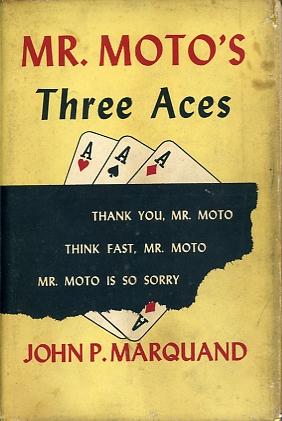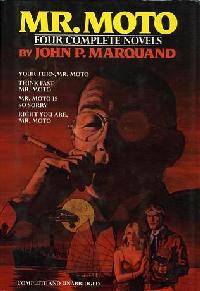
|
|
1956 Little Brown BCE omnibus
|
|

|
|
1983 Avenel Books omnibus
|
|
1956 omnibus
John P. Marquand
Mr. Moto's Three Aces
(A John P. Marquand Omnibus)
[Thank You, Mr. Moto
Think Fast, Mr. Moto
Mr. Moto Is So Sorry]
New York: Little, Brown & Company, [1956]
447 pages, hardcover (Book Club Edition)
1983 omnibus
John P. Marquand
Mr. Moto: Four Complete Novels
[Your Turn, Mr. Moto
Think Fast, Mr. Moto
Mr. Moto Is So Sorry
Right You Are, Mr. Moto]
New York: Avenel Books, 1983
661 pages, hardcover
The cover art and the blurbs on the jacket of this 1983 anthology of the 1st, 3rd, 4th, and 6th Mr. Moto novels are a bit different. The front flap of the jacket has a paragraph on each of the four stories, after introducing Mr. Moto like this.
Mr. Moto -- so small, so polite, so modest -- who would believe that he is a top-notch secret agent? The deceptive Mr. Moto is one of Japan's most valued agents: his chameleonlike ability to blend with his surroundings makes him a master of the spy game. Perfectly comfortable as a bartender, waiter, navigator, or in almost any other occupation, Mr. Moto speaks perfect English, has studied at two American universities, speaks five Chinese dialects, and is proficient in the art of judo. Beneath his disarming exterior lies a razor-sharp mind coupled with an athlete's body.
This profile of Mr. Moto could just as well have been a characterization of Japan, as viewed from the United States at the time. Ezra F. Vogel's Japan as No. 1: Lessons for America had come out in 1979, and the 1980s was a decade of hope if not belief in Japan, and concern and even fear in America, that he was or might be right.
|

